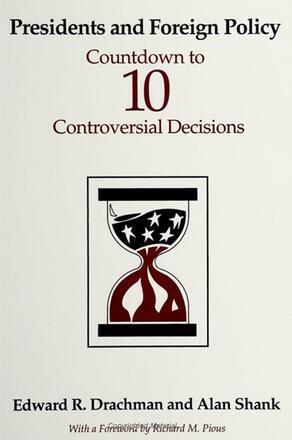
Presidents and Foreign Policy
Countdown to Ten Controversial Decisions
Alternative formats available from:
Examines ten important and controversial U. S. presidential foreign policy decisions in the post-World War II period, including one major controversy for each president from Truman to Clinton.
Description
Presidents and Foreign Policy examines countdowns to ten important and controversial decisions in the post-World War II period, using the case study approach. The authors include one major controversy for each president from Truman to Clinton. The cases cover central issues of diplomacy, war and peace, and covert action that shaped the Cold War period and its aftermath in all major areas of the world.
After reviewing the historical background of each decision, each case examines the foreign and domestic policy context, the effectiveness of presidential decision-making, and results of the decision. The reader is challenged to think about each decision by responding to a unique evaluation scheme the authors developed and tested.
Edward R. Drachman is Associate Professor of Political Science at the State University of New York, College at Geneseo. He is the author of Challenging the Kremlin: The Soviet Jewish Movement for Freedom, 1967–1990 and United States Policy Toward Vietnam. Alan Shank is Chair and Professor of Political Science at State University of New York, College at Geneseo. He is coeditor (with Martin Fausold) of The Constitution and the American Presidency, also published by SUNY Press, and author of Presidential Policy Leadership: Kennedy and Social Welfare.
Reviews
"Edward Drachman and Alan Shank have created superb case studies of controversial presidential decisions. The case study approach isn't new: what is exciting is the pedagogy they employ—the countdown approach. These cases are forward looking rather than retrospective: they describe each issue the president faced as it unfolded, and as it presented itself to the White House and the nation for decision.
"The countdown approach to controversial presidential decisions is a major contribution to our understanding of presidential decision-making in foreign policy, not only for undergraduate and graduate students, but also for the general reader who wishes a better understanding of how presidents decide, and how their decisions affect our national interest. Drachman and Shank have produced a truly propaedeutic work: a study that ought to precede the reading of other analytical and theoretical approaches to presidential decision-making in foreign policy. " — Richard M. Pious, from the Foreword
"This book is well written, well organized, up-to-date, and provides a longitudinal view. Clearly intended for classroom use, it is interesting to read and covers a significant topic. " — Barbara Kellerman, coauthor of The President as World Leader